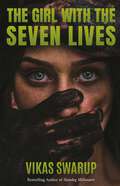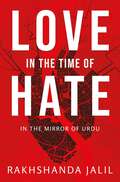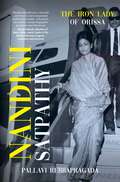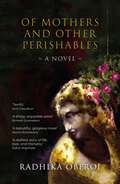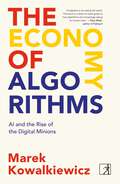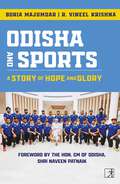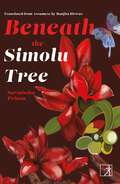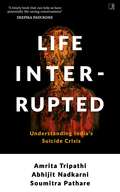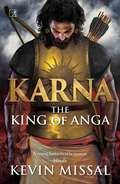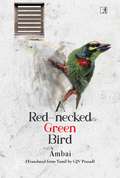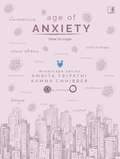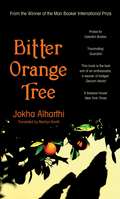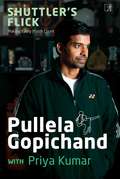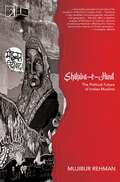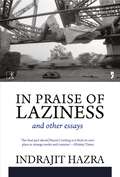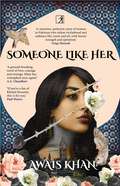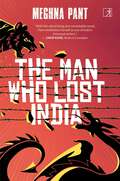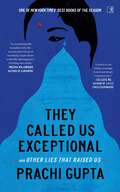- Table View
- List View
The Girl with the Seven Lives
by Vikas SwarupTwenty-five-year-old Devi has been kidnapped. She is now being held hostage in a dimly-lit basement by a masked gunman who is threatening to shoot her dead unless she reveals her entire life story and confesses to all the crimes he is accusing her of. To add to her terror, he is putting her life up for an online auction, where the highest bidder will determine her fate. With her very existence hanging in the balance, Devi proceeds to give her captor &‘a confession to beat all confessions&’, while simultaneously engaging in a high-stakes battle of wits and endurance against impossible odds. Thus commences an enthralling odyssey through the heart and soul of modern India, as over the course of a single night, Devi unveils the secrets of her seven extraordinary lives. From the labyrinthine alleys of Delhi to the hallowed grounds of Punjab, from the serene landscapes of Kerala to the sun-drenched shores of Goa, and ultimately to the bustling streets of Mumbai, Devi&’s captivating journey is a rollercoaster ride through a tangled tapestry of hidden truths, deceit, and shocking revelations which will keep readers on the edge of their seats until the very last page. Devi is the ultimate survivor - a girl from the gutters who dares to rewrite her own destiny. But can she survive the longest night of her life? Vikas Swarup&’s long-awaited new novel is filled with the same evocative prose, immersive narrative and propulsive energy that made Slumdog Millionaire a global bestseller, and will resonate with readers looking for a thoughtful page-turner.
Love in the Time of Hate: In the Mirror of Urdu
by Dr Rakhshanda JalilKabhi hum bhi tum bhi thhe aashna tumhein yaad ho ke na yaad ho Once you and I were friends, whether you remember it now or not--Momin Khan Momin This is a book about love—love for one&’s country and for all that goes to make it one we can be proud to belong to. Poetry, it has been said, flourishes when all else is uncertain. With that in mind, renowned literary historian and translator, Rakhshanda Jalil, uses Urdu poetry to look at how the social fabric of secular India is changing. Rakhshanda delves into the past, to the events that have threatened communal harmony, from the bloodletting of partition, or the politics of successive elections, to communal riots, Mumbai, Gujarat and so on, to the present moment, to recent events around Ayodhya, cow slaughter and &‘love jihad&’. The book is divided into four sections: politics, people, passions, places. Strewn with delightful, thoughtful Urdu couplets that bring depth, lyricism and gravitas to the narratives, the writer cautions us against current popular sentiments based on hating the &‘other&’. Living in an India that now requires us to be resolutely one or the &‘other&’, all of us are losing the wonderful capacity to contain within ourselves many seemingly diverse ideologies and beliefs which is a motif that is reiterated through the verses and words in this book. The section titled &‘People&’ has the most delightful, charming vignettes of popular icons, from Tipu Sultan and Rani Lakshmi Bai to Gandhi and Nehru, from Ghalib and Majaz to Dilip Kumar and Lata Mangeshkar, viewed through an Urdu lens that makes each person memorable, unique and an advocate of peace and unity. From essays doused in the language of secular patriotism like Har Dil Tiranga, to pieces redolent with nostalgia like Dopahar ki Dhoop Mein, Rakhshanda invokes the power of love, inclusivity and communal harmony that is the trademark of poetry and literature, and which must continue to permeate the way we live our lives if we want to bequeath a meaningful legacy to the generations to come in our country.
Nandini Satpathy: The Iron Lady of Orissa
by Pallavi RebbapragadaObliterated from the pages of history, as women often are, Odisha&’s first woman Chief Minister, Nandini Satpathy, known also as the Iron Lady of Orissa, was born to a family of revolutionaries and intellectuals. During her teenage years in the &‘40s, this petite girl in a starchy cotton saree was jailed for pulling down the Union Jack from atop the edifice of Ravenshaw College. Thus began the makings of a force to be reckoned with. Coming up through the ranks to ultimately reach the hallowed halls of the Rajya Sabha at the mere age of 31, this grassroots student politician went on to become the I&B minister in Indira Gandhi&’s first government, where she facilitated the working of the Free Bangla Radio that played a key role in the information war that was &’71. She hobnobbed with the likes of Raj Kapoor, Nargis, and Meena Kumari as India produced films around socialist films and warmed up to Russia. And still, in Delhi circles, she is best remembered as &‘Indira Gandhi&’s friend&’. Nandini&’s political career was as tumultuous as her friendship with Indira Gandhi. They were a close-knit duo, brought together by circumstances and kept together by a strong sense of affection and loyalty. That was until the Emergency. Where once she had enjoyed the proximity to the PMO and all the privileges that it came with, Nandini&’s opposition to the Emergency led to a fall from grace. This loss was not just the loss of a friend; it also meant the loss of her political career. During her chief-ministerial tenure, she implemented radical land reforms and tore down the tobacco trade mafia. These were actions that made her a lot of enemies. Once protected by her friendship with the prime minister, she was now subjected to brutal vendetta. In the twilight years of her life, Nandini succumbed to the deep grief of losing her husband and the ignominy of political obscurity. This is the story of Nandini Satpathy.
Of Mothers and Other Perishables
by Radhika OberoiOf Mothers and Other Perishables is an exquisite articulation of grief. It is also the sharp-eyed tale of a city tethered to violence and bursting with nazms. The morbidly funny voice of a dead woman echoes through the walls of her beloved storeroom, a compact space that contains her earthly belongings: cupboards full of silk sarees and baby clothes, albums of black-and-white photographs, a collection of vinyl records, a record player, old leather suitcases, an ebony-and-gold sewing machine. She reminisces about the past, and about the disease that causes her untimely death. Her storeroom becomes a quaint Bioscope of her life in Delhi as a young woman in the 1970s and 80s, decades that bring her romance, marriage, motherhood. The novel oscillates between the dead woman&’s yearnings and the immediacy and excitement of a parallel narrative — her daughter&’s. Nicknamed The Wailer (from the band Bob Marley and the Wailers), the dead woman&’s daughter offers a sardonic glimpse into the world of advertising — the night before a presentation, temperamental colleagues, the buzz of writers and art directors at work. But the peculiar dynamics of The Wailer&’s advertising firm alter drastically, when protests break out in the city of Delhi. Protesters swarm the streets, hollering against a new bill that persecutes the Muslim community. A Muslim art director is drawn to the pulsing heart of this movement. The Wailer, too, is inadvertently involved. Both narratives — the deceased mother&’s digressional memories, and The Wailer&’s palpable reality — also tell of Toon, The Wailer&’s younger sister, who is the CEO of a coffee startup. Their worlds converge to offer shards of the past, and navigate through a turbulent present. Personal and political histories collide in this haunting tale of many betrayals.
Banned: A Social Media Trial
by Boria MajumdarA social media trial can break you. There were 100,000 tweets of abuse for days on end, all premised on a set of untruths pushed by someone hugely powerful because he had played for the national team. Against the entitled, I never stood a chance. The online trial forced me and the family to draw on every last bit of inner strength, and yet left permanent scars. Having served the ban, I wanted closure in the form of this book. But no one knows better that there will never be a full stop. I will not get back the two years of opportunities that I lost, or the days and evenings when I was almost a stranger to my daughter. For two years, my wife and I never had a quiet dinner where we could just relax. There was not one evening when we didn&’t discuss the issue and the book. Which outsider can quantify the impact it had on the mental health of my family? On my wife, my mother, my sister and my daughter? I became cynical about a number of things, and it will be tough to change that. Writing this book and putting the truth out there has drained and exhausted me. The truth is that the falsehoods piled up against me, ratified by all-knowing social media trolls, changed my life and that of my family. There is no going back to what we were. This was our Long Covid.
The Economy of Algorithms: AI and the Rise of the Digital Minions
by Marek Kowalkiewicz&‘A damn well-written book . . . a thrilling, entertaining whirlwind tour of different AI algorithms and their industry applications.&’ —Tobias Lange, Senior Vice President, Siemens Digital Industries Software Welcome to the economy of algorithms. It&’s here and it&’s growing. In the past few years, we have been flooded with examples of impressive technology. Algorithms have been around for hundreds of years, but they have only recently begun to &‘escape&’ our understanding. We are so impressed by what they can do that we give them a lot of agency. But because they are so hard to comprehend, this leads to all kinds of unintended consequences. In the twentieth century, we had the economy of corporations. In the first two decades of the twenty-first century, we saw the emergence of the economy of people, otherwise known as the digital economy, enabled by the internet. Now we&’re seeing a new economy take shape: the economy of algorithms. – How can we use algorithms to automate the boring parts of our jobs, enhance decision-making and drive innovation? – Where is the line between algorithmic &‘help&’ and surveillance? – Can an algorithm take your job? – How do you advertise to a fridge? – Do algorithms dream of electric sheep? – Why is it so hard to predict where technology will go next? These questions and more are answered by this exciting and ground-breaking book, which includes nine rules for flourishing in the new economy of algorithms.
Odisha and Sports: A Story of Hope and Glory
by Boria Majumdar Vineel Krishna RavellaFor decades, Odisha was considered as one of India&’s most backward states. But under the leadership of Naveen Patnaik, it has made huge strides in every sphere, from human-development indices and disaster management to becoming the role model for India&’s future sporting programme. This book, co-authored by Boria Majumdar, one of India&’s best known sports scholars and commentators, and Vineel Krishna, Secretary Sports for the Government of Odisha, is an attempt to make sense of that transformation, especially in the sporting space. It is a tale of what can happen when a wealth of untapped talent is harnessed by proper administration and planning, and the creation of state-of-the-art infrastructure. It is the story of how a state stepped in at the last minute to stage a major event, and how its success turned into a springboard for future endeavours. It documents the sea change that has been witnessed in the past half-decade, with the creation of world-class stadia, high-performance centres and hostels to house the most talented kids from the relatively under-developed regions of the state. It&’s also testament to the resilience and determination of the athletes, many of whom have overcome colossal odds to shine on the world stage. Most of all though, it&’s a story of hope – of what can happen when a government prioritises its people and recognises the power of sport to bring about lasting and positive social change.
Beneath the Simolu Tree
by Sarmistha PritamIn a village in rural Assam, quiet, unassuming Paridhi grows up witnessing domestic violence at close quarters. The conservative society she inhabits, shapes and befuddles her. Her rebellion is silent—she submerges herself in a world of colour. Pebbles turn into objects of art in her hands. She writes and reads extensively to escape her cloistered life. But to what end? Is it really ever possible to escape one&’s confines? The house she&’s lived in ever since her childhood, now infested with termites, is her responsibility now. With an ageing mother, an ailing uncle and an absentee brother, Paridhi feels like she has no one to depend on. Except perhaps Bondeep. But with passing time, there are growing concerns—will Bondeep&’s family ever be able to accept her? She could always confide in the vivacious Juroni, her best friend, neighbour and confidant. But Juroni has secrets of her own, which she keeps close to her heart until the inevitable, devastating end. Peopled with characters great and small, Beneath the Simolu Tree follows Paridhi as she navigates life, confronts injustices and comes out stronger but not embittered. Stories and realities are brought into sharp conflict in this tale of human yearning, as Pritam explores the depths of her innermost desires. At the heart of this novel lies the one question we spend our entire lives searching an answer for—what is it to love and be loved?
Life, Interrupted: Understanding India's Suicide Crisis
by Amrita Tripathi Dr Abhijit Nadkarni Dr Soumitra Pathare"A timely book that can help us have potentially life-saving conversations" - DEEPIKA PADUKONE, Actor & Founder, LiveLoveLaugh&“A shocking fact and huge wake-up call is that suicide is the leading cause of death for young Indians. As a country — across all our expertise and fields of interest — we need to pay closer attention, and this book urges us to do just that, with clear policy level suggestions and a call to action.&” -ABHINAV BINDRA In India we tend to have a fatalistic attitude towards suicide, tending to believe that nothing can be done to prevent it, focusing only on the politically volatile issue of farmer suicides, or periodically, when there is a death by suicide of a prominent personality or suicides in vulnerable groups (for example, students especially after Board exam results), there is a hue and cry in the popular press with opinion makers demanding immediate action.Why should you care? Because a disproportionate number of young Indians die by suicide and these are preventable deaths.The resulting knee-jerk reaction from policymakers is to offer some immediate solutions (appointing counsellors in colleges, etc.) which have little evidence of success. After a while, everyone forgets the issue, until the next such event and the cycle repeats itself.This book aims to present evidence-based strategies to tackle suicide, using interviews, case studies and conversations that lay readers can make sense of, while proposing an outline of steps that policymakers, journalists and key stakeholder groups can collaborate on to provide better solutions and save precious lives in India.
Karna: The King of Anga
by Kevin MissalIron Age of India… around 900 B.C.E.Born in the arms of the Ganga, Vasu grew up in the raging province of Anga. His life shaped by a fate that failed to be just—neglected by his own, stripped of his birthright—he was raised to be lost in an abyss of desires and disappointment.Cursed by his guru, hurt by the only woman he loved, ostracised from society for being the son of a suta. With his only armour—hope—he ventured on an unforgettable journey. Alone.This is Vasu&’s tale of survival, of endurance, of abiding courage in the face of all adversities. And eventually, of blossoming into the greatest warrior of all time… KARNA.In an ultimate battle against his archenemy—the insidious, dishonourable and all-powerful, Jarasandha, for a title he knew he deserved. From a sutaputr to a leader of the people, this is a saga of betrayal, lost love, and glory.This is the story of the King of Anga.
A Red-necked Green Bird
by AmbaiMyths and legends jostle with the contemporary in these stories where social issues of our times resonate with the inevitability of the past. The lyricism of Carnatic ragas permeate the pages of this quiet and powerful book in which love is rendered in all its immeasurable avatars—parental, carnal, platonic, romantic, divine. There is the woman who reinvents the notion of love in a unique way that amalgamates technology and spirituality through the internet; a man full of love who can sing Bulleh Shah and the woman who has lost her all in the 1984 anti-Sikh riots; the woman in the title story who stands by her deaf daughter but understands why her husband must leave the home they have built with love all these years; the man who finds out what it is to be a woman after a dip in the pond... These short stories are shorn of sentimentality but have a deep understanding of what it means to live, to love and to die. CS Lakshmi, writing under the pseudonym Ambai, has been a significant voice in Indian literature for the past four decades. A Red-necked Green Bird is the writer&’s seventh collection of short stories.
Age of Anxiety: How to Cope
by Amrita Tripathi Kamna Chhibber&‘What does it mean when someone says they have Anxiety?&’&‘I&’m stressed and nervous all the time, do I have Anxiety?&’&‘Will I ever get better?&’These are some of the questions we want to answer in this book. Is this the Age of Anxiety? Well, how could it not be – when so many millions of us feel that persistent combination of heart palpitations, impending doom, dread, even lack of control, as one of our contributors describes it. The question is, what can we do about it?Through this book we will learn how to distinguish between anxiety as 'an attack of the nerves' or something that will come and go, and Anxiety as a disorder, which will need treatment, including possibly therapy or medication. The conversations are even more pertinent given the global Covid-19 pandemic, prolonged periods of social isolation and an increased focus on mental health and wellness. We learn from coping with Anxiety Disorders, sharing their journey to healing, explaining exactly what would have helped them along the way, as they seek to bust common myths and misconceptions.
Bitter Orange Tree
by Jokha AlharthiZuhur, an Omani student at a British university, is caught between the past and the present. As she attempts to form friendships and assimilate in Britain, she can&’t help but ruminate on the relationships that have been central to her life. Most prominent is her strong emotional bond with Bint Amir, a woman she always thought of as her grandmother, who passed away just after Zuhur left the Arabian Peninsula. As the historical narrative of Bint Amir&’s challenged circumstances unfurls in captivating fragments, so too does Zuhur&’s isolated and unfulfilled present, one narrative segueing into another as time slips, and dreams mingle with memories.The eagerly awaited new novel by the winner of the Man Booker International Prize, Bitter Orange Tree is a profound exploration of social status, wealth, desire, and female agency. It presents a mosaic portrait of one young woman&’s attempt to understand the roots she has grown from, and to envisage an adulthood in which her own power and happiness might find the freedom necessary to bear fruit and flourish.
Shuttler's Flick: Making Every Match Count
by Pullela Gopichand Priya Kumar'But the return is not always easy, especially when the world has moved on without you, when the people who were rooting for you have now found other heroes to support.' When Pullela Gopichand had to undergo a risky arthroscopic surgery, chances of his full recovery were not great. His return to the badminton court seemed a far-fetched dream. The odds were stacked against him. Then, in 1998, he won the bronze in the Commonwealth Games. His biggest win was yet to come. In 2001, Pullela became the second Indian to win the All England Championship. This is the story we know. From not being able to walk to winning the most prestigious title in badminton, this is Pullela the player. But his success hasn&’t stopped at just him. The Pullela Gopichand Badminton Academy, set up in 2008, boasts of a host of World No. 1s including Saina Nehwal and Srikanth Kidambi and World Badminton Champion PV Sindhu. What is it about his teachings that propels players right to the top? In his official autobiography, we meet Pullela the coach. Through his own voice, as well as those of his students, mother, and wife, we get a look at the mind that revolutionised the game. We are shown not only what it takes to get to the top, but also, and more importantly, how to stay there. With the principles of his play laid bare, we are invited to apply them to our own everyday lives. In doing so, we ask questions, take accountability for our actions and perhaps find the answer to the greatest question of all—what does it take to become a champion?
Shikwa-e-Hind: The Political Future of Indian Muslims
by Dr Mujibur RehmanRoughly 200 million today, Indian Muslims are greater than the population of Britain and France or Germany put together. According to the Indian Constitution, Indian Muslims are treated as political equals, which is what India&’s secular polity promised after its independence, encouraging more than 35 million Indian Muslims at the time of Partition to choose India as their motherland over Pakistan. However, the supposed relationship of equality between Hindus and Muslims as scripted in the constitution is being increasingly replaced by the domineering tendencies of a Hindu majority in India today. The author describes the current state and position of Indian Muslims (the seeds for which were sown when the BJP came to power in 2014) as the thirdpolitical moment; the second he believes was in 1947 when the community was given equal status in the Indian Constitution; and the first, was in 1857 when Indian Muslims learnt to live under the British colonial state. As he states, there is no denying that political circumstances for Indian Muslims were not completely ideal or full of democratic energy prior to the rise of the Hindu Right since the late 1980s. With numerous layers defined by language, ethnicity, region, etc., Muslims have the most heterogeneous identity, representing India&’s quintessential diversity. And yet, Muslims are perceived as the most enduring well-grounded threat to the majoritarian project of the Hindu Rashtra. Indian Muslims are perceived or presented as perpetrators of violence and violators of law, even if they are at the receiving end. They are viewed as an internal enemy, who need to be dealt with for political, social, historical, and ideological reasons. Going forward, the community must formulate the language of democratic rights of Indian Muslims as equal citizens and define the ethics of human dignity in their struggle to reassert their place in India&’s political power structures at all levels: from panchayat to Parliament. While the economic future or cultural rights of Indian Muslims have been debated since 1947, it is the political future that demands attention because only as an equal and participatory community in the politics of the nation, can economic and cultural futures be addressed. This book explores the political future of Indian Muslims in this context. From Shaheen Bagh to Hindu-Muslim riots, from the unique position of Muslim women in India to the Sachar Report and the Muslim backwardness debate, Mujibur Rehman analyses, confronts and discusses the urgent concerns of Indian Muslims in a manner that is nuanced and globally relevant.
In Praise of Laziness and Other Essays
by Indrjait HazraA cross between a collection of philosophical investigations and idle banter, In Praise of Laziness and Other Essays, is a celebration of what Milan Kundera defined as &‘Mystification: the active form of refusing to take the world seriously&’. From an Erasmian encomium to laziness, a literary forensic report on the adult years of Sukumar Ray&’s Pagla Dashu and Mark Twain&’s Huckleberry Finn, the joys of staying indoors, to the exquisite pleasures of an electric blanket—and with a science fiction story on colonisation bunged in—this book is the equivalent of a meandering river in which the reader dips his or her toes in, not knowing whether a dolphin will come by or a piranha take a snap. This is a book that&’s equal parts serious as well as frivolous, except you never quite know which parts are which.
Someone Like Her
by Awais KhanA young Pakistani woman is the victim of an unthinkable act of vengeance, when she defies convention for love, facing seemingly insurmountable challenges and danger as she attempts to rebuild her life. Multan, Pakistan. A conservative city where an unmarried woman over the age of twenty-five is considered a curse by her family. Ayesha is twenty-seven. Independent and happily single, she has evaded an arranged marriage because of her family's reduced circumstances. When she catches the eye of powerful, wealthy Raza, it seems like the answer to her parents' prayers. But Ayesha is in love with someone else, and when she refuses to give up on him, Raza resorts to unthinkable revenge… Ayesha travels to London to rebuild her life and there she meets Kamil, an emotionally damaged man who has demons of his own. They embark on a friendship that could mean salvation for both of them, but danger stalks Ayesha in London, too. With her life thrown into turmoil, she is forced to make a decision that could change her and everyone she loves forever.
The Man Who Lost India
by Meghna PantThe year is 2032. China declares war on India. Pillage and plunder ensues. The war comes to an abrupt halt when a supernatural event saves the obscure town of Lalbag from annihilation. Even as China renews its efforts to invade Lalbag, a greater calamity awaits this sleepy town. A Chinese cop stumbles upon a dangerous secret that threatens to end the town&’s immunity. A fierce and forbidden love between a servant and his mistress destroys two families. Meanwhile, the town&’s richest man becomes afflicted with a terrible disease, the town beauty goes mad when her love betrays, and a psychic turns water into blood, sending the town and its people deeper into tragedy. A dystopian never-been-done-before tale set in – and between – China and India, The Man Who Lost India is a powerful portrayal of love, strife and family in the wake of 21st century&’s biggest war. Incantatory and atmospheric, this is Meghna Pant&’s most ambitious novel yet, full of beauty, bloodshed and undeniable feminist power.
They Called Us Exceptional: And Other Lies That Raised Us
by Prachi GuptaAn Indian American daughter reveals how the dangerous model minority myth fractured her family in this "searingly honest memoir that manages to be at once a scalding indictment and a heartfelt love letter" (Scott Stossel, author of My Age of Anxiety). "In examining with boundless love the secrets and sorrows of one family, Gupta shows us the life-altering power of telling one's truth."--Megha Majumdar, author of A Burning How do we understand ourselves when the story about who we are supposed to be is stronger than our sense of self? What do we stand to gain--and lose--by taking control of our narrative? These questions propel Prachi Gupta's heartfelt memoir and can feel particularly fraught for immigrants and their children who live under immense pressure to belong in America. Prachi Gupta's family embodied the American Dream: a doctor father and a nurturing mother who raised two high-achieving children with one foot in the Indian American community, the other in Pennsylvania's white suburbia. But their belonging was predicated on a powerful myth: that Asian Americans have perfected the alchemy of middle-class life, raising tight-knit, ambitious families that are immune to hardship. Molding oneself to fit this perfect image often comes at a steep but hidden cost. In They Called Us Exceptional, Gupta articulates the dissonance, shame, and isolation of being upheld as an American success story while privately navigating traumas invisible to the outside world. Gupta addresses her mother throughout the book, weaving a deeply vulnerable personal narrative with history, postcolonial theory, and research on mental health, to show how she slowly made sense of her reality and freed herself emotionally and physically from the pervasive, reductive myth that had once defined her. But, tragically, the act that liberated Gupta was also the act that distanced her from those she loved most. By charting her family's slow unraveling and her determination to break the cycle, Gupta shows how traditional notions of success keep us disconnected from ourselves and one another--and passionately argues why we must orient ourselves toward compassion over belonging.
المفتاح الكوني
by تشارلز ف هانليعالج الكتاب بشكل رئيسي مواضيع متعلقة باسلوب التفكير والتعامل مع العقل والذات "والمحيط" حيث يؤشر الكتاب الى ان واقع حياة الانسان ما هو الا ترجمة لنفسيته وشخصيته التي بنيت عبر انماط تفكيره السابقة وأن السبيل الى تحسين واقع الشخص لا يتأتى الا عبر تحسين انماط تفكيره. يرشد الكتاب القاريء الى كيفية تغيير انماط تفكيره عبر توضيح حقائق حول ما هو مفيد وما هو ضار من أشكال التفكير بالاضافة الى تمارين وتدريبات عقلية وذهنية.
فن الانتقاء
by شيينا أنغار مايا أرسلانكل شيء يبدأ بقصة - جوزيف كامبل قبل شهر من أوان الولادة أبصرت النور في مدينة تورنتو في أثناء عاصفة ثلجية غطت المدينة بوشاح أبيض ولفتها بالسكون. فمفاجأة قدومي إلى العالم وصعوبة الرؤية التي واكبته كانتا بمثابة إنذارات لم يتم الاكتراث لها حينئذ .
الأولاد المشاغبون
by سو كوليحين تعرف كيف تتعامل مع سوء السلوك تصبح حياتك سهلة وتجد نفسك حرا للقيام بوظيفتك ألا وهي التدريس. في صف منضبط يعتبر التدريس من أروع المهن في العالم. فكل يوم يقد م لك تجربة جديدة ومختلفة: فرصة رؤية التلاميذ وهم يكتشفون مفاهيم جديدة ويتعل مون أشياء لم يعرفوها من قبل فرصة صنع اختلاف حقيقي في حياة التلاميذ. وكما يقال: لا أحد ينسى المعلم الجيد ولكن ماذا يعني المعلم الجيد بالضبط
مخاطر العولمة
by روبرت إسحاق سعيد الحسنيةظهر "الرجل العادي" في أوائل القرن العشرين بعقل عادي وكان شخصا راضيا بالرخاء المادي والكسل بدلا من الكفاح من أجل التفو ق أو امتلاك السلطة . أما في نهاية القرن العشرين المنصرم فقد تميزت بما يمكن تسميته بـ "ثورة الأثرياء" ضد هذه المفاهيم سواء كانت بالمفهوم البرجوازي أم الاشتراكي. رو جت هذه الردة المحافظة التي تزعمتها رئيسة الوزراء البريطانية مارغريت تاتشر والرئيس الأميركي رونالد ريغان في الثمانينيات مقولة أن الأسواق الرأسمالية الحرة هي مثال مجر د لأنها محر ك المرونة الفردية والحرية.
المعلومات والمال
by توم ليدون و جون إف. واسيكالفصل الأول : فشل صناديق الاستثمار ونشأة الصناديق المتداولة في البورصة الفصل الثاني : فن التأشير باستخدام خطة كيف تجني المال من وراء المعلومات الفصل الثالث : الاستثمار في الأسهم المحلية: الصناديق المتداولة في البورصات الخاصة بالأسهم الأميركية الفصل الرابع : الاستثمار على الصعيد العالمي: الصناديق المتداولة في بورصات الأسهم الأجنبية الفصل الخامس : التقسيم والمغامرة: قطاعات الصناديق المتداولة في البورصة الفصل السادس : الذهب والفضة والبترول: الصناديق المتداولة في البورصة الخاصة بالسلع الفصل السابع : الاستثمار في ما لا يستحق: الصناديق المتداولة في البورصات الخاصة بالعملات الفصل الثامن : الحصول على قطع من سوق السندات: الصناديق المتداولة في البورصة الخاصة بالدخل الثابت الفصل التاسع : التقاعد: برنامج (e) 401 للتقاعد الفصل العاشر : التحوط لعملياتك: الصناديق المتداولة الدائنة والمكشوفة الفصل الحادي عشر : ماذا سيحدث مستقبلا مستقبل الصناديق المتداولة في البورصة الفصل الثاني عشر : محافظ الصناديق المتداولة في البورصة وفقا لفكر كيف تجني المال من وراء المعلومات
الوصايا السبع
by جين مارشالهناك أساليب عديدة لكسب المال في سوق الأسهم ولكن التشبث بالطريقة المعتادة أو المسماة الحكمة الموروثة ليست واحدة منها. ولهذا فإن الوصايا السبع الواردة في هذا الكتاب هي - بكل تأكيد - بعيدة كل البعد عن التفكير التقليدي حيث إنها تهدف إلى برمجة عقلك وتفكيرك لترى دوما سوق الأسهم على أنها سوق الفرص. ولا بد لهذه الوصايا السبع من أن تعمل على إنارة سبيلك وتخليصك من الأفكار النمطية القديمة المتعلقة بالسوق وتشجيعك على البحث عن الفرص الاستثمارية الخفية التي يمكن من خلالها كسب المال وصنع الثروة.
